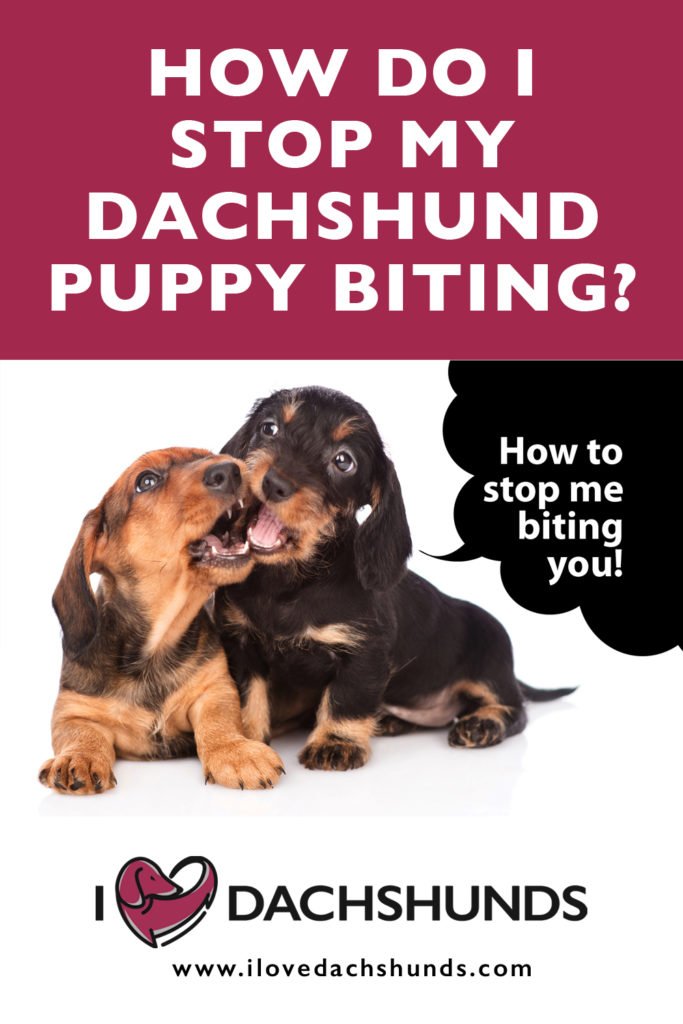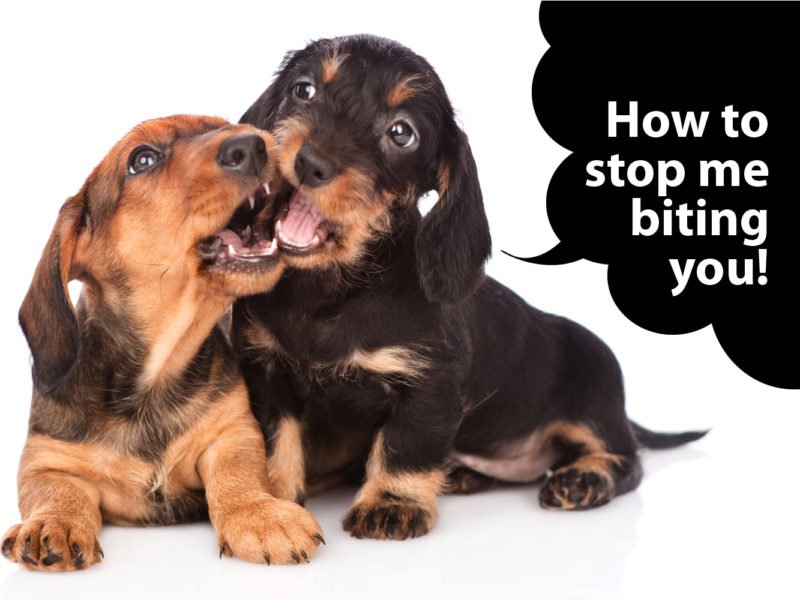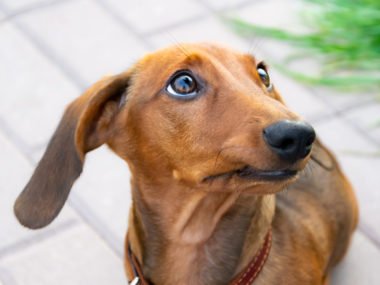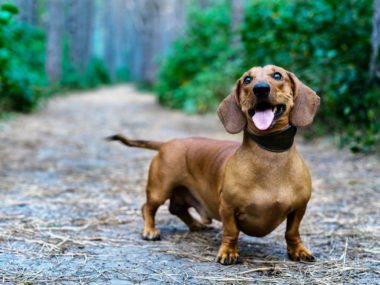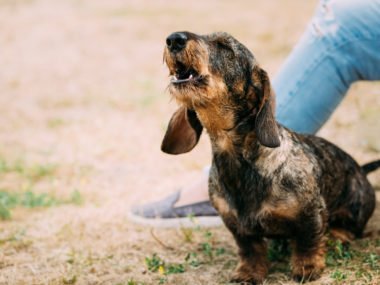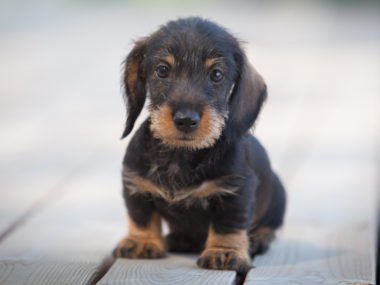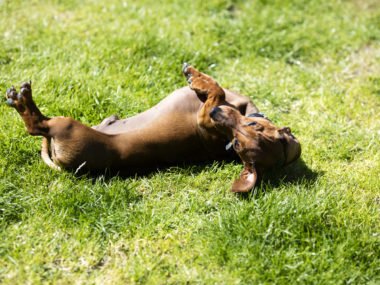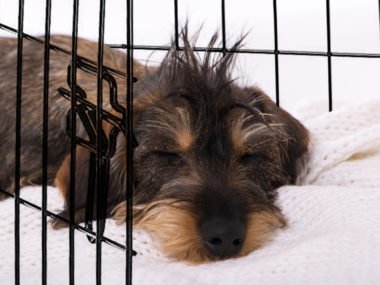Do you have a new dachshund puppy? Is he mouthing, biting or nipping a bit too much? Maybe it hurts when he bites and you don’t know what to do? Here’s everything you need to know about dachshund puppies and biting.
How Do I Stop My Dachshund Puppy Biting?
- Make a loud ‘Ouch!’ noise
- Distract your dachshund with toys
- Praise your dachshund for playing nicely
- Ignore your dachshund when he bites
- Leave the room for a short time
- Use a crate for time-out
- Be consistent with training
- Biting must stop play!
Read on to find out why puppies bite, how long this stage goes on for, and how to nip it in the bud once and for all!
Table of Contents
- Why Is My Dachshund Puppy Biting?
- How Do I Stop My Dachshund Puppy Biting?
- What Age Do Dachshund Puppies Stop Biting?
- Should I Shout At My Dachshund For Biting?
- Should I Hit Or Punish My Dachshund For Biting?
- Should I Use A Water Bottle Spray When My Dachshund Bites?
- Will Puppy Classes Help My Dachshund With Biting?
- How Do I Stop My Dachshund Biting Aggressively?
- Do Dachshunds Bite When They’re In Pain?
- Will Neutering Stop My Dachshund Biting?
- What do I do next?
This article is based on research and personal experience as a Dachshund owner of 10+ years. I’m not a Vet or qualified dog behaviourist.
Why Is My Dachshund Puppy Biting?
Dachshunds, like all puppies, use their mouths to explore their world. They bite or ‘mouth’ people and other dogs to get their attention. They nip when they’re playing and having fun. They chew when they’re teething to sooth sore gums. Puppies don’t mean to hurt you, but can accidentally catch your skin and even draw blood. You can’t stop them completely – it’s a natural part of their development – but you can teach them how to behave. You want them to learn to play nicely with their own toys, not chew on you or your family!
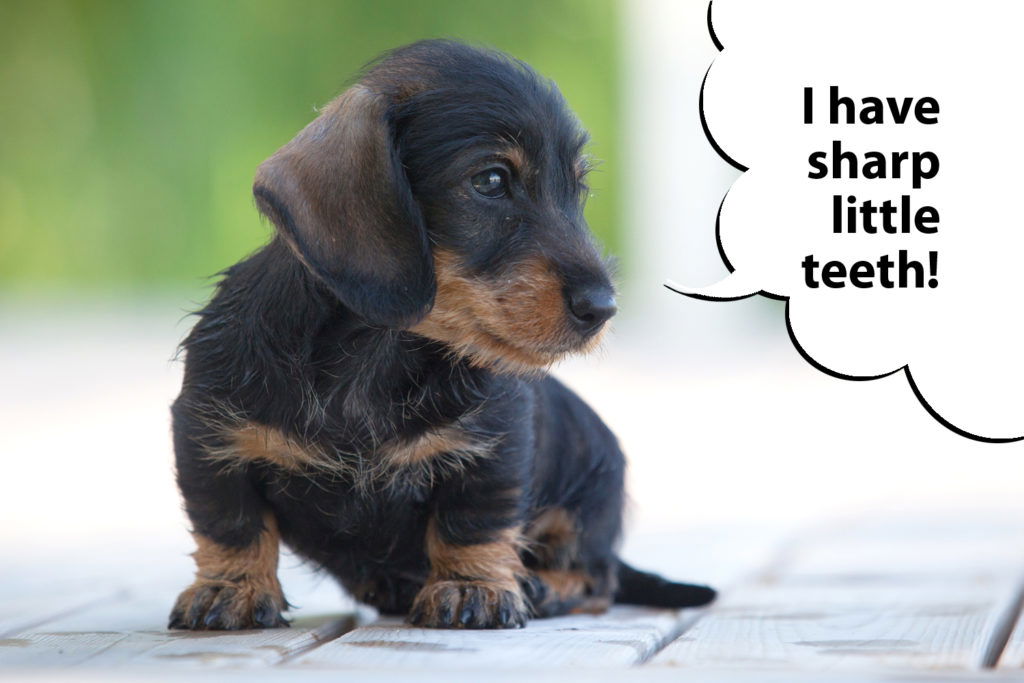
How Do I Stop My Dachshund Puppy Biting?
This is how to stop your dachshund from biting or mouthing:
1. Make a loud noise
If your dachshund puppy bites or nips too hard, you need to say ‘Ouch!’ in a short, sharp, high pitched voice. This mimics the natural behaviour of his littermates yelping when bitten too hard, and should stop him doing it. At the moment, he just doesn’t understand it hurts you, so you need to teach him that it does!
2. Distract your dachshund
Next, you need to distract your dachshund with toys (or chilled carrot if he’s biting due to teething). Move his focus away from your hands and on to something fun. Every time he goes to bite or mouth you, put a squeaky toy near his face to encourage him to chew that instead. Rubber toys are your best defence against being nipped! You need to teach him that it’s OK to chew and bite his toys (good boy) but not OK to nip you (Ouch!).
3. Praise your dachshund
If your dachshund plays nicely with his toys, remember to praise him. People often forget this step but it’s actually really important. He needs to understand the difference between being good and doing something wrong. The best way to do this is to change the tone of your voice. Calm and gentle for ‘good boy’ and short and sharp for ‘Ouch!’. Give lots of attention and praise for good behaviour and totally ignore any bad behaviour.
4. Ignore your dachshund
If your dachshund continues to sink his teeth into you, stop playing and ignore him. Relax your arm and let it hang by your side, and then slowly move your hand out of his reach. If you pull away too fast, your dachshund’s sharp little teeth could catch your skin. Sit really still. Don’t say anything and don’t look at him. He’s biting to get your attention so, however hard it is, don’t give him any attention and look the other way. You need to teach him that biting and nipping immediately stops play!

5. Leave the room
Slowly stand up and leave the room for a couple of minutes. Don’t speak to your dachshund or look at him. In fact, don’t give him any attention at all. This is just to calm him down a bit before trying again. Once you come back into the room, you can try playing with him again. If he starts mouthing or nipping as soon as you sit down, repeat all the steps above until he gets the message – biting must stop play!
6. Use a crate
As a last resort, if your puppy’s mouthing and biting is getting out of hand, pop him in his crate for a couple of minutes. Don’t use the crate as punishment, and don’t ever shout or scold your dachshund while he’s in there. Just pick him up in silence and put him in to calm him down a bit. You could also put some toys inside to encourage him to play with them instead. This can also be helpful if you have guests over, especially if your puppy isn’t leaving them alone.
7. Be consistent
Make sure the whole family or household is on the same page with regard to puppy training. Everyone needs to use the same commands and follow the same rules. If one person allows him to bite and nip and someone else doesn’t, the training wont work. You must be consistent to get his biting and nipping under control!
8. Get into a routine
Routines are so important and helpful with new pups. Schedule your dachshund’s daily exercise and playtime to prevent any pent up energy making him too feisty and bitey. Giving your dachshund enough mental and physical stimulation throughout the day, should calm down his biting, nipping, chewing and mouthing. It will still happen, but should be a lot more under control.
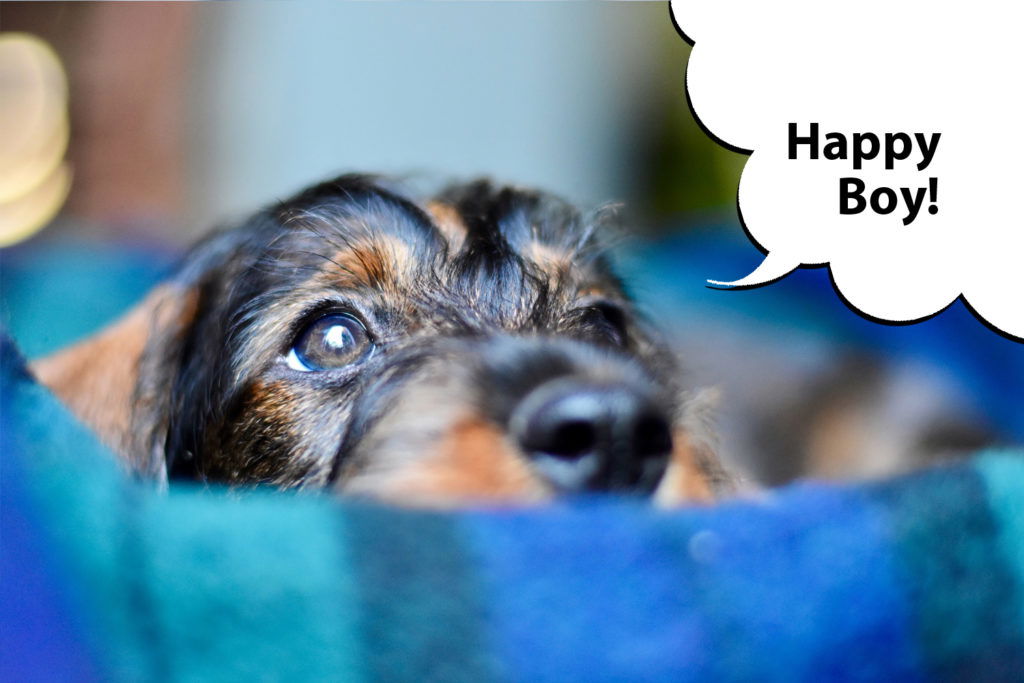
9. Be careful around children
This goes without saying but, when your dachshund is at that nippy stage, be mindful around your children. Puppies can get over-excited and accidentally scratch or draw blood. So it’s best to supervise playtime and make sure your children are careful around your dachshund too. Dachshunds generally make great family dogs, they just need some basic puppy training to learn right from wrong.
10. Teach the ‘Gently’ command
When your dachshund puppy is at that bitey stage, it’s a good idea to teach him the ‘Gently’ command. He needs to understand what ‘Gently’ means so he’s gentle around your hands, and those of your family. Once your dachshund understands the command, you can use it when he plays too rough or bites you.
How to teach a dachshund the ‘Gently’ command:
- Ask your dachshund so ‘Sit!’
- Put a treat in the centre of your hand
- Make sure your palm is facing upwards
- Say the command ‘Gently’ in a calm but firm tone
- If your dachshund grabs for the treat, close your hand, say “No!” and move it away
- Open your hand again slowly
- Say the command ‘Gently’
- Keep repeating until he gets it!
Dachshunds are smart so it shouldn’t take him long to learn. Use the command every time you give food or treats by hand. In fact, say ‘Gently’ for anything where he takes something from your hand, even for things like toys. It’s ideal if you have children, as he should learn to be more gentle around them and not snatch things from their hands.
What Age Do Dachshund Puppies Stop Biting?
In general, dachshunds bite or mouth a lot less by the time they reach 10 months old. At around 18-24 months, they’ll still chew toys, but shouldn’t mouth or bite you. If they’re still catching your skin or hurting you, you need to work harder on training. If you feel there’s any underlying aggression, don’t leave it! Speak to your vet or dog behaviourist for advice.
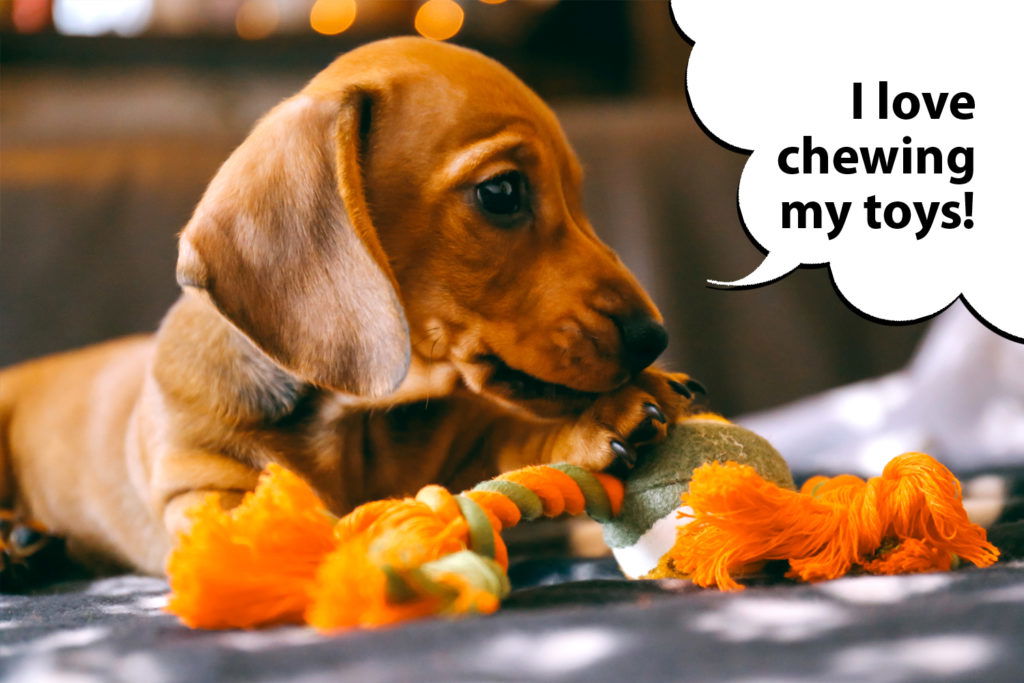
Should I Shout At My Dachshund For Biting?
No, don’t ever shout at your dachshund for biting. Use firm but clear corrections and change the tone of your voice to show him right from wrong. Always keep the training positive and teach him how you want him to behave. Shouting may just frighten him and stop him trusting you – and you don’t want that!
Should I Hit Or Punish My Dachshund For Biting?
No, don’t ever hit, smack or punish your dachshund for mouthing or biting. You’ll break the bond of trust you have and he may become fearful of you. Any form of physical punishment could make your dachshund scared, defensive or aggressive further down the line. The best approach is to reward good behaviour and ignore bad behaviour.
Should I Use A Water Bottle Spray When My Dachshund Bites?
No! Spraying your dachshund with water when he bites is a negative way to train him. It’s much better to focus on positive reinforcement training. Use simple corrections like ‘Ouch!’, and reward him when he stops biting and does the right thing. It can sometimes be challenging, but it really is the best way to go. Dachshunds hate being ignored and will change their behaviour when they figure out what you want them to do.
Will Puppy Classes Help My Dachshund With Biting?
Yes, puppy classes should teach your dachshund how to control his biting. Any socialisation will help his general behaviour as he’ll naturally learn what’s right and wrong from the other dogs he plays with. They’ll yelp when bitten too hard and he’ll basically learn to back off a bit. This doesn’t mean he’ll no longer bite when he plays, but he should understand he needs to be more gentle.
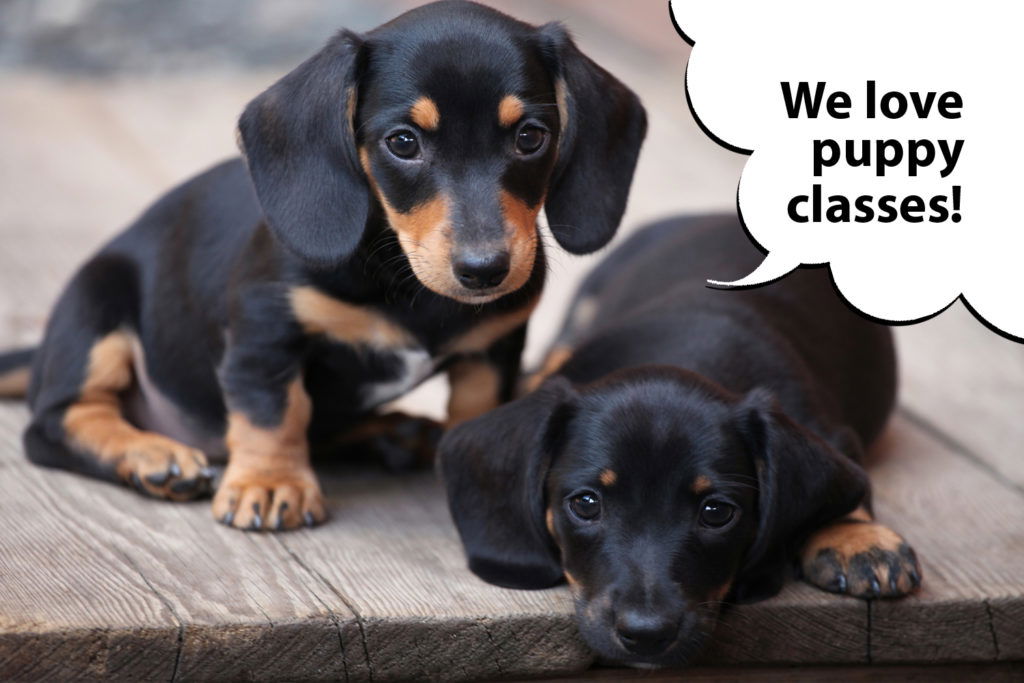
How Do I Stop My Dachshund Biting Aggressively?
If your dachshund’s biting has become aggressive, you need to speak to your vet or a trained dog behaviourist to get things under control. Aggression can happen for many reasons. Maybe you rescued your dachshund and he was treated badly in the past, or maybe he’s become too attached to you and gets a bit over-protective. There can be so many reasons for fear and aggression, so it’s best to figure things out with a professional.
Do Dachshunds Bite When They’re In Pain?
Yes, dachshunds can bite when they’re in pain or unwell, but not all will. If you think about it, dogs have no way to tell us when they’re hurting or suffering, they can only show us. So, even though your dachshund might not mean to lash out, his natural instinct would be to warn you by growling, and protect himself by nipping. So, if you think your dachshund is unwell or has hurt himself, contact your vet right away.
Will Neutering Stop My Dachshund Biting?
In most cases, neutering will calm your dachshund down, but it won’t stop your puppy chewing, mouthing or play biting. It also isn’t advisable to neuter before your puppy is fully mature, at around 12 months old. You’ll be through the worst of the mouthing, nipping and biting stage by then, so it’s better to use the 10 x tips above to teach your dachshund the right and wrong way to behave.
So, there you have it. Dachshund puppies bite, nip, mouth and chew to explore their world. It can’t be stopped, but it can be controlled. Moving his attention away from your hands and on to his toys, is the best way to handle this stage of his development. Remember to ignore the bad behaviour, reward the good, and teach him how to be gentle. Dachshunds really do love to learn so, be patient and consistent, and he’ll figure things out in no time!
What do I do next?
If you read all the way to the end of this article, you’re exactly the sort of person I’d love to join my Facebook Group. Your support for my blog means everything to me. And, if you enjoyed this article or found it helpful, please kindly share below. Thank you! 💋
